
NOVORAPID FLEXPEN 100 U/mL injectable solution in a prefilled pen
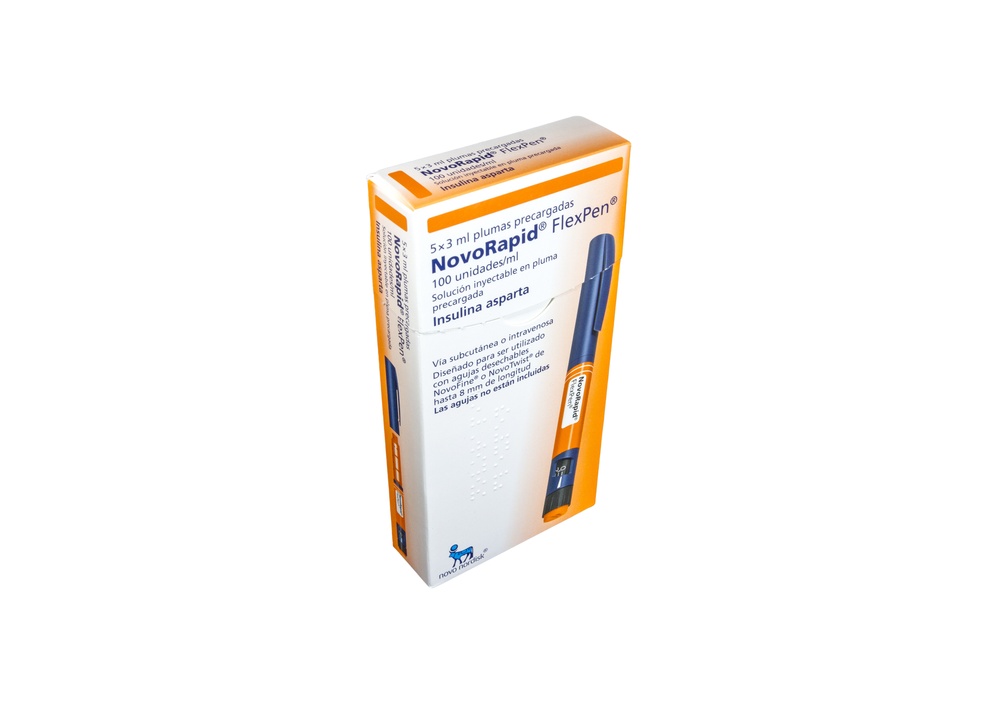

How to use NOVORAPID FLEXPEN 100 U/mL injectable solution in a prefilled pen
Translated with AI
This page provides general information and does not replace a doctor’s consultation. Always consult a doctor before taking any medication. Seek urgent medical care if symptoms are severe.
Show originalContents of the leaflet
Introduction
Package Leaflet: Information for the User
NovoRapid FlexPen 100 units/ml solution for injection in a pre-filled pen
insulin aspart
Read all of this leaflet carefully before you start using this medicine because it contains important information for you.
- Keep this leaflet, you may need to read it again.
- If you have any further questions, ask your doctor, nurse or pharmacist.
- This medicine has been prescribed for you only. Do not pass it on to others. It may harm them, even if their signs of illness are the same as yours.
- If you get any side effects, talk to your doctor, nurse or pharmacist. This includes any possible side effects not listed in this leaflet. See section 4.
Contents of the pack
- What is NovoRapid and what is it used for
- What you need to know before you use NovoRapid
- How to use NovoRapid
- Possible side effects
- Storing NovoRapid
- Contents of the pack and other information
1. What is NovoRapid and what is it used for
NovoRapid is a modern insulin (insulin analogue) with a fast action. Modern insulins are improved versions of human insulin.
NovoRapid is used to reduce high blood sugar levels in adults, adolescents and children from 1 year of age with diabetes mellitus (diabetes). Diabetes is a disease where the body does not produce enough insulin to control blood sugar levels. Treatment with NovoRapid helps to prevent complications of diabetes.
NovoRapid will start to lower your blood sugar levels 10-20 minutes after injection, and will have its maximum effect between 1 and 3 hours after injection, with the effect lasting for 3-5 hours. Due to its short duration of action, NovoRapid is usually given in combination with intermediate or long-acting insulin preparations.
2. What you need to know before you use NovoRapid
Do not use NovoRapid
? if you are allergic to insulin aspart or any of the other ingredients of this medicine (see section 6, Contents of the pack and other information).
? if you suspect you are having a low blood sugar (hypoglycaemia) (see a) Summary of serious and frequent side effects in section 4).
? if the FlexPen has been dropped, damaged or crushed.
? if it has not been stored correctly or if it has been frozen (see section 5, Storing NovoRapid).
? if the insulin does not look like water and is not clear.
If any of these conditions apply to you, do not use NovoRapid. Talk to your doctor, nurse or pharmacist.
Before using NovoRapid
? Check the label to ensure it is the right type of insulin for you.
? Always use a new needle for each injection to prevent contamination.
? Needles and NovoRapid FlexPen must not be shared.
? NovoRapid FlexPen is only intended for injection under the skin. Talk to your doctor if you need to inject the insulin by another method.
Warnings and precautions
Certain conditions and activities may affect your insulin requirement. Talk to your doctor:
? if you have kidney, liver, adrenal, pituitary or thyroid problems.
? if you are doing more physical exercise than usual or if you want to change your diet, as this may affect your blood sugar level.
? if you are ill, continue your insulin treatment and talk to your doctor.
? if you are going to travel abroad, differences in time zones between countries may affect your insulin requirement and the timing of your injections.
Changes at the injection site
You should rotate the injection site to help avoid changes in the fatty tissue under the skin, such as lumps, thickening or pitting. Insulin may not work as well if you inject into a lumpy, thickened or pitted area (see section 3, How to use NovoRapid). Tell your doctor if you notice any changes at the injection site. Tell your doctor if you are currently injecting into a lumpy, thickened or pitted area before you start injecting into a different area. Your doctor may tell you to check your blood sugar more often and to adjust your insulin dose or your other antidiabetic medications.
Children and adolescents
Do not give this medicine to children under 1 year of age, as there is no experience with the use of NovoRapid in this age group.
Other medicines and NovoRapid
Tell your doctor, nurse or pharmacist if you are using, have recently used or might use any other medicines.
Some medicines affect your blood sugar level and this may mean you need to adjust your insulin dose. The following medicines may affect your treatment with NovoRapid:
Your blood sugar level may be lowered (hypoglycaemia) if you take:
- other medicines for the treatment of diabetes;
- monoamine oxidase inhibitors (MAOIs) (used to treat depression);
- beta-blockers (used to treat high blood pressure);
- angiotensin-converting enzyme (ACE) inhibitors (used to treat certain heart conditions or high blood pressure);
- salicylates (used to relieve pain and lower fever);
- anabolic steroids (such as testosterone);
- sulphonamides (used to treat infections).
Your blood sugar level may be raised (hyperglycaemia) if you take:
- oral contraceptives (birth control pills);
- thiazides (used to treat high blood pressure or an excessive fluid build-up);
- glucocorticoids (such as “cortisone” used to treat inflammation);
- thyroid hormones (used to treat thyroid disorders);
- sympathomimetics (such as epinephrine [adrenaline] or salbutamol or terbutaline used to treat asthma);
- growth hormone (a medicine used to stimulate growth in children and adolescents);
- danazol (a medicine used to treat conditions such as endometriosis, a condition where tissue from the womb is found outside the womb).
Octreotide and lanreotide (used to treat acromegaly, a rare hormonal disorder that usually occurs in adults, caused by the pituitary gland producing too much growth hormone) may increase or decrease your blood sugar level.
Beta-blockers (used to treat high blood pressure) may mask the signs of low blood sugar, and may make it more difficult for you to recognise the warning signs of low blood sugar.
Pioglitazone (tablets used to treat type 2 diabetes)
Some patients with type 2 diabetes who were treated with pioglitazone and insulin developed heart failure. Tell your doctor as soon as possible if you notice any signs of heart failure such as unusual shortness of breath, rapid increase in weight or localised swelling (oedema).
If you have taken any of the medicines mentioned above, tell your doctor, nurse or pharmacist.
Alcoholic beverages and use of NovoRapid
? If you drink alcohol, your need for insulin may change, as your blood sugar level may be either increased or decreased. Careful monitoring is recommended.
Pregnancy and breast-feeding
? If you are pregnant, think you may be pregnant or are planning to have a baby, ask your doctor for advice before using this medicine. NovoRapid can be used during pregnancy. You may need to adjust your insulin dose and your diet during pregnancy and after giving birth. It is very important to maintain good control of your diabetes during pregnancy and after giving birth to prevent complications to your baby.
- There are no restrictions on the use of NovoRapid during breast-feeding.
Ask your doctor, nurse or pharmacist for advice before using this medicine while pregnant or breast-feeding.
Driving and using machines
? Ask your doctor whether you can drive or operate machinery:
- if you often have low blood sugar (hypoglycaemia);
- if you find it hard to recognise the warning signs of low blood sugar.
If your blood sugar is too low or too high, your ability to concentrate and react may be impaired, which could affect your ability to drive or operate machinery. You could endanger yourself or others.
A consequence of the rapid onset of action of NovoRapid is that hypoglycaemia may occur more quickly after injection, compared to human soluble insulin.
Important information about some of the ingredients of NovoRapid
NovoRapid contains less than 23 mg (1 mmol) of sodium per dose, which means that it is essentially “sodium-free”.
3. How to use NovoRapid
Dose and when to inject the insulin
Follow exactly the instructions for injecting insulin and adjusting the dose given by your doctor. If you are not sure, ask your doctor, nurse or pharmacist.
NovoRapid should normally be administered immediately before a meal. You should eat a meal or snack containing carbohydrates within 10 minutes of the injection to avoid hypoglycaemia. When necessary, NovoRapid can be administered immediately after a meal. For more information, see below How and where to inject.
Do not change your insulin unless your doctor tells you to. If your doctor switches you to another type or brand of insulin, you may need to adjust your dose.
Use in children and adolescents
NovoRapid can be used in adolescents and children from 1 year of age in place of human soluble insulin, when a fast-acting insulin is preferred. For example, when it is difficult to inject in relation to meals.
Use in special patient groups
If you have kidney or liver problems, or if you are over 65 years of age, you should check your blood sugar more often and consult your doctor about any changes in your insulin dose.
How and where to inject
NovoRapid should be injected under the skin (subcutaneously). Never inject yourself directly into a vein (intravenously) or into a muscle (intramuscularly). NovoRapid FlexPen is only intended for injection under the skin. Talk to your doctor if you need to inject the insulin by another method.
For each injection, change the injection site within the area of skin that you usually use. This may reduce the risk of developing lumps or depression under the skin (see section 4, Possible side effects). The best areas for injection are the front of your waist (abdomen), the upper arm or the front of your thighs. The insulin will work more quickly if injected into the front of your waist. You should always measure your blood sugar levels regularly.
How to handle NovoRapid FlexPen
NovoRapid FlexPen is a pre-filled, disposable pen with a colour coding system that contains insulin aspart.
Read carefully the instructions for using NovoRapid FlexPen included in this package leaflet. You should use the pen as described in the instructions.
Always make sure you use the correct pen before injecting the insulin.
If you use more insulin than you need
If you take too much insulin, your blood sugar level may become too low (hypoglycaemia). See a) Summary of serious and frequent side effects in section 4.
If you forget to use your insulin
If you forget to inject your insulin, your blood sugar level may become too high (hyperglycaemia). See c) Effects of diabetes in section 4.
If you stop using your insulin
Do not stop using your insulin without talking to your doctor first. This could lead to very high blood sugar levels (severe hyperglycaemia) and ketoacidosis. See c) Effects of diabetes in section 4.
If you have any further questions on the use of this medicine, ask your doctor, nurse or pharmacist.
4. Possible Adverse Effects
Like all medicines, this medicine can cause adverse effects, although not all people suffer from them.
- Summary of serious and very frequent adverse effects
Low blood sugar level (hypoglycemia)is a very frequent adverse effect. It can affect more than 1 in 10 people.
Low sugar levels may appear if:
- too much insulin is injected;
- you eat very little or skip a meal;
- you do more exercise than usual;
- you drink alcohol (see Alcoholic Beverages and Use of NovoRapid in Section 2).
Warning signs of low blood sugar: cold sweat, cold and pale skin, headache, palpitations, nausea, excessive hunger, temporary changes in vision, drowsiness, unusual fatigue and weakness, nervousness or tremors, anxiety, confusion, and difficulty concentrating.
A severe drop in blood sugar can lead to loss of consciousness. If a severe and prolonged drop in blood sugar is not treated, it can cause brain damage (transient or permanent) and even death. You can recover consciousness more quickly if someone who knows how to do it administers a glucagon injection to you. If you are given glucagon, you should take glucose or a sugary product as soon as you regain consciousness. If you do not respond to glucagon treatment, you should be treated in a hospital.
What to do if your blood sugar level is low:
? If your blood sugar level is low, take glucose tablets or a sugary product (candies, cookies, fruit juice). Measure your blood sugar level if possible and then rest. Always carry glucose tablets or sugary foods with you in case you need them.
? When the symptoms of hypoglycemia have disappeared or when your blood sugar levels have stabilized, continue your insulin treatment as usual.
? If you have had blood sugar levels so low that they have caused you to lose consciousness, if you have needed to be given a glucagon injection, or if you have had many drops in blood sugar levels, talk to your doctor. You may need to adjust the amount or schedule of your insulin, food, or exercise.
Inform others that you have diabetes and what the consequences may be, including the risk of losing consciousness due to a drop in blood sugar level. Tell them that if you become unconscious, they should lay you on your side and seek medical help immediately. They should not give you anything to eat or drink, as you could choke.
Severe allergic reactionsto NovoRapid or any of its components (called a systemic allergic reaction) is a very rare but potentially fatal adverse effect. It can affect up to 1 in 10,000 people.
Consult your doctor immediately:
- if the signs of allergy spread to other parts of your body.
- if you suddenly feel unwell and have sweats, vomiting, difficulty breathing, palpitations, feel dizzy.
? If you notice any of these symptoms, consult your doctor immediately.
Changes in the skin at the injection site: If you inject insulin in the same place, the fatty tissue can shrink (lipoatrophy) or become thicker (lipohypertrophy) (can affect up to 1 in 100 people). Lumps under the skin can also occur due to the accumulation of a protein called amyloid (cutaneous amyloidosis; the frequency of this is not known). Insulin may not work very well if it is injected into a lumpy, shrunken, or thickened area. Change the injection site to help avoid these skin changes.
- List of other adverse effects
Uncommon adverse effects
Can affect up to 1 in 100 people.
Allergic signs: local allergic reactions can occur at the injection site (pain, redness, hives, inflammation, bruising, swelling, and itching). These reactions usually disappear after a few weeks of treatment. If the symptoms do not disappear, or if they spread throughout your body, consult your doctor immediately. See also Severe Allergic Reactions above.
Visual problems: when starting insulin treatment, you may have problems with your vision, but this alteration is usually temporary.
Joint swelling: when starting insulin treatment, fluid accumulation can cause inflammation of the ankles and other joints. This effect usually disappears quickly. If it does not, consult your doctor.
Diabetic retinopathy (an eye disease related to diabetes that can lead to vision loss): if you have diabetic retinopathy and your blood sugar level improves very quickly, the retinopathy may worsen. Consult your doctor.
Rare adverse effects
Can affect up to 1 in 1,000 people.
Painful neuropathy (pain due to nerve damage): if your blood sugar level improves very quickly, you may suffer from nerve-related pain. This is called acute painful neuropathy and is usually transient.
Reporting of adverse effects
If you experience any kind of adverse effect, consult your doctor, pharmacist, or nurse, even if it is a possible adverse effect that is not listed in this leaflet. You can also report them directly through the Spanish Medicines Agency's website: www.notificaRAM.es. By reporting adverse effects, you can help provide more information on the safety of this medicine.
- Effects of diabetes
High blood sugar level (hyperglycemia)
High sugar levels may appear if:
- you have not injected enough insulin;
- you forget to inject insulin or interrupt insulin treatment;
- you repeatedly inject less insulin than you need;
- you have an infection or fever;
- you eat more than usual;
- you do less physical exercise than usual.
Warning signs of high blood sugar:
the warning signs appear gradually. These include: increased need to urinate, thirst, loss of appetite, feeling of dizziness (nausea or vomiting), drowsiness or fatigue, dry and reddened skin, feeling of dryness in the mouth, and fruity breath odor (acetone).
What to do if your blood sugar level is high:
? If you notice any of the symptoms described: check your blood sugar level, check the ketone level in your urine if possible, and consult your doctor immediately.
? These can be symptoms of a very serious disorder called diabetic ketoacidosis (acid builds up in the blood because the body breaks down fat instead of sugar). If left untreated, it could produce a diabetic coma and death.
5. Storage of NovoRapid
Keep this medicine out of the sight and reach of children.
Do not use this medicine after the expiration date that appears on the FlexPen label and on the carton, after EXP. The expiration date is the last day of the month indicated.
Always keep the pen cap on your FlexPen when not in use to protect it from light. NovoRapid must be protected from heat and excessive light.
Before opening:the unused NovoRapid FlexPen should be stored in a refrigerator between 2°C and 8°C, away from the walls or the cooling component of the refrigerator. Do not freeze.
During use or when carrying as a spare: you can carry your NovoRapid FlexPen with you and store it at a temperature below 30°C or in a refrigerator (between 2°C and 8°C) for 4 weeks. If stored in a refrigerator, keep it away from the walls or the cooling component of the refrigerator. Do not freeze.
Medicines should not be disposed of via wastewater or household waste. Ask your pharmacist how to dispose of the packaging and any unused medicine. This will help protect the environment.
6. Package Contents and Additional Information
Composition of NovoRapid
- The active substance is insulin aspart. Each ml contains 100 units of insulin aspart. Each pre-filled pen contains 300 units of insulin aspart in 3 ml of injectable solution.
- The other components are glycerol, phenol, metacresol, zinc chloride, disodium phosphate dihydrate, sodium chloride, hydrochloric acid, sodium hydroxide, and water for injectable preparations.
Appearance of the Product and Package Contents
NovoRapid is presented as a solution for injection.
Packages containing 1 (with or without needles), 5 (without needles), and 10 (without needles) pre-filled pens of 3 ml. Not all pack sizes may be marketed.
The solution is clear and colorless.
Marketing Authorization Holder and Manufacturer
Marketing Authorization Holder
Novo Nordisk A/S, Novo Allé, DK-2880 Bagsværd, Denmark
Manufacturer
The manufacturer can be identified by the batch number printed on the carton lid and on the label:
- If the second and third characters are S6, P5, K7, R7, VG, FG, or ZF, the manufacturer is Novo Nordisk A/S, Novo Allé, DK-2880 Bagsværd, Denmark.
- If the second and third characters are H7 or T6, the manufacturer is Novo Nordisk Production SAS, 45 Avenue d’Orléans, F-28000 Chartres, France.
Now, on the back, read the information on how to use FlexPen.
Date of the last revision of this leaflet:03/2023
Other Sources of Information
Detailed information on this medicine is available on the European Medicines Agency's website: http://www.ema.europa.eu.
Instructions on how to use NovoRapid injectable solution in FlexPen.
Read the following instructions carefully before using your FlexPen.If you do not follow the instructions carefully, you may administer too little or too much insulin, which could result in a blood sugar level that is too high or too low.
FlexPen is a pre-filled insulin pen. Doses of 1 to 60 units can be selected, in increments of 1 unit. FlexPen is designed to be used with the NovoFine or NovoTwist disposable needles of up to 8 mm in length. As a precaution, always carry a spare insulin delivery device in case your FlexPen is lost or damaged.

Pen Care
You must handle your FlexPen with care.
If it is dropped, damaged, or impacted, there is a risk that the insulin may leak out. This could cause inaccurate dosing, which may result in a blood sugar level that is too high or too low.
You can clean the outside of your FlexPen with a cotton swab dipped in alcohol. Do not submerge, wash, or lubricate it, as the pen may be damaged.
Do not refill your FlexPen. Once empty, it must be discarded.
Preparing NovoRapid FlexPen
Check the name and color labelof your pen to ensure it contains the correct type of insulin.This is especially important if you use more than one type of insulin. If you use the wrong type of insulin, your blood sugar level may become too high or too low.
A
Remove the pen cap.

B
Remove the paper flag from a new disposable needle.
Screw the needle straight and firmly onto your FlexPen.

C
Remove the large outer needle cap and set it aside for later.

D
Remove the inner needle cap and discard it.
Never try to put the inner needle cap back on. You could stick yourself with the needle.

Always use a new needle for each injection. This reduces the risk of contamination, infection, insulin loss, needle blockage, and inaccurate dosing.
Be careful not to bend or damage the needle before use.
Insulin Flow Check
Before each injection, small amounts of air may be produced in the cartridge during normal use. To avoid injecting air and ensure proper dosing:
E
Turn the dose selector until 2 units are selected.
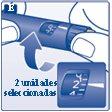
F
Hold your FlexPen with the needle pointing upwards and gently tap the cartridge with your finger a few times to make any air bubbles rise to the top of the cartridge.

G
With the needle still pointing upwards, press the push button all the way in. The dose selector returns to 0.
A drop of insulin should appear at the needle tip. If not, change the needle and repeat the procedure up to a maximum of 6 times.
If a drop of insulin still does not appear, the pen is defective, and you should use a new one.
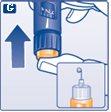
Always make sure a drop appears at the needle tip before injecting. This ensures that the insulin flows. If no drop appears, you will not inject insulin, even if the dose selector moves. This may indicate that the needle is blocked or damaged.
Always check the flow before injecting. If you do not check the flow, you may receive too little or no insulin, which could result in a blood sugar level that is too high.
Dose Selection
Check that the dose selector is set to 0.
H
Turn the dose selector to select the number of units you need to inject.
The dose can be corrected forwards and backwards by turning the dose selector in any direction until the corrected dose is aligned with the dose marker. When turning the dose selector, be careful not to press the push button, as insulin may be released.
You cannot select a dose greater than the number of units remaining in the cartridge.
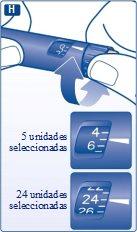
Before injecting the insulin, always use the dose selector and the dose marker to see how many units you have selected.
Do not count the clicks of the pen. If you select an incorrect dose and inject it, your blood sugar level may become too high or too low. Do not use the remaining insulin scale, as it only shows the approximate amount of insulin left in the pen.
Injection
Insert the needle under the skin. Use the injection technique indicated by your doctor or nurse.
I
Inject the dose by pressing the push button all the way in so that the 0 is aligned with the dose marker. Be careful to press the push button only when injecting.
Turning the dose selector does not inject insulin.
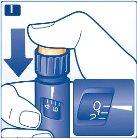
J
Keep the push button fully pressed and keep the needle under the skin for at least 6 seconds. This ensures that the full dose is injected.
Remove the needle from the skin and release the push button.
Always make sure the dose selector returns to 0 after injection. If the dose selector stops before reaching 0, the full dose has not been administered, which may result in a blood sugar level that is too high.
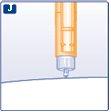
K
Cover the needle with the large outer cap without touching it. When the needle is covered, carefully press the large outer cap all the way in and then unscrew the needle.
Dispose of it carefully and put the pen cap back on.

Always remove the needle after each injection and keep your FlexPen without the needle attached. This reduces the risk of contamination, infection, insulin loss, needle blockage, and inaccurate dosing.
Other Important Information
People caring for patients should be careful when handling used needles to reduce the risk of accidental needlestick injuries and infections.
Dispose of your used FlexPen carefully without leaving the needle attached.
Never share the pen or needles with others. This could lead to infections.
Never share the pen with others. Your medicine could be harmful to their health.
Always keep the pen and needles out of sight and reach of others, especially children.
- Country of registration
- Average pharmacy price43.21 EUR
- Active substance
- Prescription requiredYes
- Manufacturer
- This information is for reference only and does not constitute medical advice. Always consult a doctor before taking any medication. Oladoctor is not responsible for medical decisions based on this content.
- Alternatives to NOVORAPID FLEXPEN 100 U/mL injectable solution in a prefilled penDosage form: INJECTABLE, 100 U/mlActive substance: insulin aspartManufacturer: Novo Nordisk A/SPrescription requiredDosage form: INJECTABLE, 100 U/mlActive substance: insulin aspartManufacturer: Novo Nordisk A/SPrescription requiredDosage form: INJECTABLE, 100 U/mlActive substance: insulin aspartManufacturer: Novo Nordisk A/SPrescription required
Online doctors for NOVORAPID FLEXPEN 100 U/mL injectable solution in a prefilled pen
Discuss questions about NOVORAPID FLEXPEN 100 U/mL injectable solution in a prefilled pen, including use, safety considerations and prescription review, subject to medical assessment and local regulations.
Frequently Asked Questions















